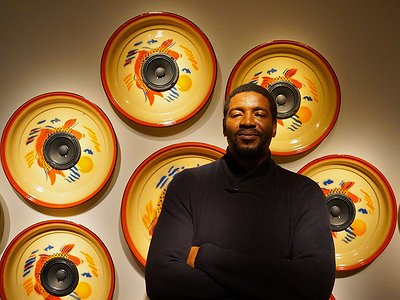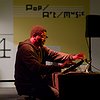Part 1
Name: Emeka Ogboh
Nationality: Nigerian
Occupation: Sound artist, video artist
Current release: Emeka Ogboh's 6°30’33.372”N 3°22’0.66”E is out via his own Danfotronics imprint.
Recommendations:
Music: "Weightless" by Marconi Union - This track stands out not just for its calming and ethereal quality but also for the unique concept behind its creation. Commissioned by Radox Spa and guided by sound practitioner Lyz Cooper, Marconi Union crafted this piece specifically to lower the listener's heart rate and induce relaxation. The blend of art and science in its conception makes it a must-listen for anyone interested in the therapeutic potential of music.
Painting: Jeremy Geddes' works - His paintings capture moments that seem to defy gravity and time. I just can’t explain it, but they do evoke a deep sense of wonder and emotion in me.
[Read our Marconi Union interview]
[Read our Richard Talbot of Marconi Union interview]
If you enjoyed this Emeka Ogboh interview and would like to stay up to date with his music and projects, visit his official homepage.
When I listen to music, I see shapes, objects and colours. What happens in your body when you're listening? Do you listen with your eyes open or closed?
When I listen to music, my experience is more emotional than visual. I usually listen with my eyes open, and deeply connect to the rhythm. Instead of seeing shapes or colours, I feel a spectrum of emotions that vary with the genre and mood of the track.
Whether it's the melancholy of a soulful tune or the energy of an upbeat song, music takes me on a distinct emotional journey. I've learned to associate specific emotions with certain songs, allowing me to curate my listening experience based on my mood or even influence how I feel.
What were your very first steps in music like and how would you rate the gains made through experience - can one train/learn being an artist?
My journey into music production began with a deep desire to compose and create. While I always felt a natural ability to put together beats and rhythms, I lacked the technical expertise to bring my ideas to life using Digital Audio Workstations.
This led me to embark on a journey to learn the Digital Audio Workstation (DAW), specifically Ableton. I enrolled in an electronic music class to understand the intricacies of Ableton, and once I felt confident in navigating the software, I decided to chart my own path. From there, my approach to music was largely intuitive, drawing from my emotions and experiences to shape my compositions.
Over the years, the gains I've made have been invaluable. Not only have I become better in leveraging technology to enhance my music, but I've also developed a deeper understanding of electronic compositions. This evolution has been a testament to the fusion of talent and learned skills.
To answer the latter part of the question, I believe that while some aspects of artistry are inherent, there's a significant portion that can be nurtured and developed through training and experience.
According to scientific studies, we make our deepest and most incisive musical experiences between the ages of 13-16. What did music mean to you at that age and what’s changed since then?
During my teenage years, specifically between the ages of 13-16, I was immersed in the world of rap and hip-hop. At that time, music for me was a window into the lives and stories of the rappers. I would often find myself engrossed in the lyrics, fantasizing about the narratives and lifestyles these rappers portrayed through their songs. It was a phase of exploration and connection with the raw energy of the genre.
As I grew older, my musical taste expanded, becoming more eclectic and encompassing a broader range of genres. Today, my appreciation for music is less about the lyrics and more about the overall feel of a song. It's the rhythm, the melody, and the emotions they evoke that resonate with me the most.
While I'm open to any music that strikes a chord with my soul, irrespective of its genre, I've recently found myself gravitating back towards rap, especially the works of artists like Kendrick Lamar and J Cole. It feels like a journey of rediscovery, where I'm reconnecting with my youth while also appreciating the evolution of my musical tastes.
What, would you say, are the key ideas behind your approach to music and what motivates you to create?
My music is mainly influenced by field recordings, which serve as a foundation for my compositions. At the heart of my approach to music are my personal experiences, the places I've explored, and the memories associated with those spaces. Together, they weave a collage that inspires and shapes my musical creations.
Experiences I've had, locations I've visited, and memories I've cherished play a role in shaping the rhythms, melodies, and harmonies I produce. For me, music is more than just sound; it's a reflection of my field recording journeys. It's a medium through which I can revisit past moments, explore present emotions, and dream of future adventures.
This connection between my life's narrative and my musical compositions is what fuels my passion and motivates me to create.
To quote a question by the great Bruce Duffie: When you come up with a musical idea, have you created the idea or have you discovered the idea?
In my experience, the genesis of a musical idea often feels like a discovery. It's as if the idea has always been there lurking in the vast expanse of the musical universe, merely waiting for the right moment to reveal itself. Such moments of revelation, where a melody suddenly emerges, are like stumbling upon a hidden treasure.
However, once that initial idea is discovered, the subsequent journey is undeniably one of creation. It's a deliberate process of refining, arranging, and producing, where the idea is infused with my experiences and influences. This phase requires conscious decisions and technique.
So, in response to Bruce Bruce Duffie's question, I believe that while the inception of a musical idea is a moment of discovery, the journey that follows to bring that idea to fruition is very much a creative endeavour.
Paul Simon said “the way that I listen to my own records is not for the chords or the lyrics - my first impression is of the overall sound.” What's your own take on that and how would you define your personal sound?
I connect with Paul Simon's sentiment, though my perspective is shaped by a different background. Before diving into music, my art practice was rooted in documenting the acoustic ecology surrounding us and then moving it to the realm of sound design to create immersive installations. This experience provided me with an understanding of how ambient sounds converge to craft intricate soundscapes, something like an orchestra weaving together a symphony.
Consequently, I've developed an appreciation for the collective harmony of elements rather than isolating individual components.
As I navigate my musical journey, the concept of a 'personal sound' remains flexible for me. Instead of a fixed signature sound, my focus lies in the interplay of diverse sounds and how they harmonize.
Sound, song, and rhythm are all around us, from animal noises to the waves of the ocean. What, if any, are some of the most moving experiences you've had with these non-human-made sounds? In how far would you describe them as “musical”?
Nature's collage of different sounds has always struck a chord with me, and I often find myself thinking about their musicality. Animal sounds, especially those of birds and crickets, are prime examples. While their primary intent might be communication or survival, there's an undeniable rhythm and melody in their calls.
The synchronized chirping of crickets or the harmonious songs of birds can easily be likened to an orchestra, each member contributing to the collective symphony. Their sounds, though not necessarily crafted with musical intent as humans understand it, exhibit patterns, repetitions, and variations that are foundational elements of music.
The rhythmic lull of waves meeting the shore is another sound that, to me, embodies the essence of a musical composition. Its repetitive yet dynamic nature mirrors the ebb and flow of certain musical pieces, offering both predictability and surprise. The sound of tropical rain drumming on metal roofs, though a blend of nature and man-made structures, creates rhythms reminiscent of percussion instruments in a musical ensemble.
While nature's sounds might not be "musical" in their intent, their structure, rhythm, and harmony align closely with the principles of music, making them musical in their own right.






